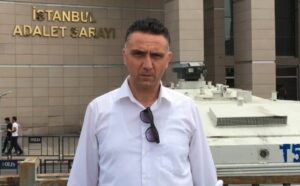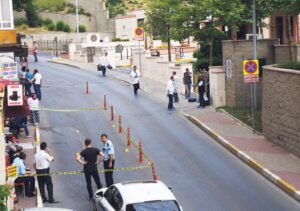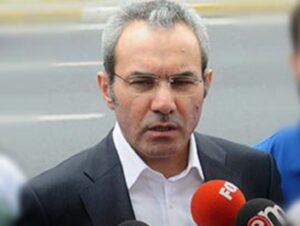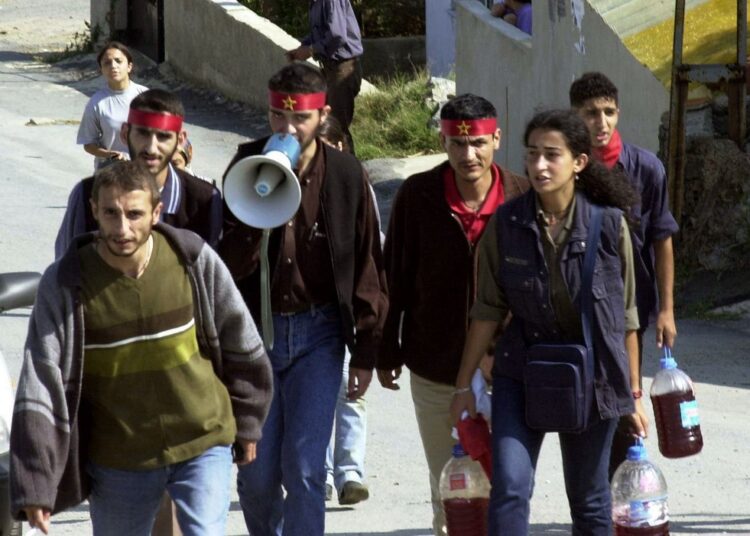Abdullah Bozkurt/Stockholm
The Turkish government allowed a police officer fired for aiding and abetting militant Marxist-Leninist organization the Revolutionary People’s Liberation Party/Front (DHKP/C) to get back to work after killing the investigation.
Atilla Aktin, a 49-year-old Turkish national from the town of Edremit, was identified as a local contact for the DHKP/C, listed as terrorist organization by Turkey, the United States, the United Kingdom, Japan and the European Union. The DHKP/C, known as Devrimci Halk Kurtuluş Partisi/Cephesi in Turkish, is virulently anti-American and anti-NATO.
The evidence against Aktin was found in a cache of some 16,000 documents sent to Turkey in 2008 by Belgium as part of judicial cooperation to identify the terrorist organization’s links in Turkey. The documents, which included secret communications and internal reports filed by DHKP/C members, were seized during multi-nation police raids in Europe in 1999.
During a review of the documents, Aktin’s name came up in several internal reports filed by senior DHKPC leaders who were in charge of operations in the Aegean region of western Turkey. They were receiving reports from the field, vetting the intelligence and passing them to the DHKP/C office in Belgium.
In a report dated April 18, 1999, a DHKP/C militant code-named Hakkı wrote that he was in contact with police officer Aktin and obtained the address of an apartment in Istanbul for former Izmir police chief Ahmet Demir.

The detailed report said the former police chief rented the flat from the owner, Haydar Ercan, and that the name next to the doorbell was that of the owner, not the police chief. The report also described the police chief’s Opel brand car with model, license plate number, color and where it was usually parked. It underlined that the police chief had no bodyguard to protect him.
The report further noted that the DHKP/C had a sympathizer, also an acquaintance of Aktin, who lived in the building next to the former police chief’s apartment. “We can make use of this flat for one month as part of the work to be carried out against Demir,” the report added.
It is clear that the terrorist organization was planning an attack on the former police chief and collecting information about his home, car and daily routine and that it planned to run surveillance from a nearby location. Aktin, working as a mole within the police department, was providing valuable intelligence to the organization to prepare for such an attack.
Another report filed on May 21, 1999 by a militant code-named Hasan informed headquarters about how secret communication and rendezvous points were arranged with officer Aktin. The organization uses a cryptic communication method known as EZOP, a coded messaging system composed of numbers, letters and symbols. The messages can be deciphered with a decoder that translates codes to readable messages.
Former police intelligence chief Erol Demirhan submitted detailed evidence collected on Atilla Aktin, who was red-flagged for aiding and abetting a far-left terrorist organization:
The organization also used the police officer’s home as a drop point and for hiding materials, thinking that his house would be safer and more secure from law enforcement action.
After these reports were turned over to Turkey by Belgium, the police launched an investigation into Aktin and secured warrants to wiretap his phone. In the end he was detained and questioned about his links to the DHKP/C. He declined to respond to questions during the police interrogation and exercised his right to keep silent in his attorney’s presence.
The police investigation corroborated the information discovered in the internal DHKPC/reports. Aktin had worked for the Izmir police department between October 1995 and June 1999 and had access to confidential information. He was working as a member of the DHKP/C, providing sensitive information including actionable intelligence to the terrorist organization and helping secure safe houses for militants.
During the execution of a search warrant for Aktin’s home, the police also found an unregistered gun and ammunition, which added a firearms violation charge to the terrorism charge in the indictment. The investigation also uncovered that he was selling district department information to residents of the town of Ayvacık, in Izmir province, when he was serving there.

Aktin was saved from his legal troubles by the government when prosecutors and police investigators were targeted by then-prime minister and current president Recep Tayyip Erdoğan, whose corrupt role in an Iran sanctions-busting scheme was made public in December 2013. The bribery investigation incriminated Erdoğan, his family members and his political and business associates in a multi-billion dollar corruption scheme and led to the arbitrary and unlawful purge of most police chiefs from the force.
To build a sham case and punish the prosecutors, judges and police chiefs who had simply done their job in investigating various crimes, the Erdoğan government enlisted convicts, criminals and shady figures as plaintiffs in dozens of cases nationwide. DHKP/C member Aktin was one of those figures who became a government witness in building such bogus cases. He was even featured on A-Haber news, a network owned by President Erdoğan’s family, in April 2014 and portrayed as an innocent victim.
In a witch-hunt indictment filed against Erol Demirhan, a former police intelligence chief in Istanbul, the government alleged that Aktin’s phone was unlawfully wiretapped even though the warrant was secured from multiple courts between 2008 and 2009, each time for a three-month period and subject to regular judicial review. What is more, the government hid Aktin’s DHKP/C background when it submitted papers to the court.

However, during the trial hearings, Demirhan submitted to the court the entire investigation file on Aktin and said a 42-page report sent to the police’s organized crime unit on September 29, 2014 made clear the plaintiff’s links to the terrorist organization DHKP/C. Interestingly a new report sent to the court by the police on January 26, 2015 not only failed to mention the 2014 report but also ignored the documents sent by Belgium. Instead, it said there was no information or documents about Aktin’s involvement with the DHKP/C.
In the meantime the government also helped quash the original criminal case launched against Aktin in 2012 on DHKP/C terror charges. On December 2, 2017 he was allowed to return to the police department and resume his job in Yozgat province.
Former intelligence chief Erol Demirhan exposed how the government kept the evidence on a DHKP/C member from the court in his defense statement:
The DHKP/C has perpetrated multiple attacks in Turkey in the past including suicide bombings, especially targeting military and security officials. It was also involved in a suicide bombing attack on the US Embassy in Ankara on February 1, 2013 and an armed attack on the US Consulate General building in Istanbul on August 10, 2015.
Some factions within the DHKP/C are believed to be under the control of Turkey’s intelligence agency MIT and were directed to carry out the attacks to manipulate the political agenda in the country. Varol Bülent Aral, a suspect in the case of the 2007 murder of three Christian missionaries including German national Tilmann Ekkehart Geske in Malatya province at the Zirve Publishing House where they worked, was revealed during the trial to be a MIT agent.
An official statement sent by the intelligence unit of the National Police Department to the Malatya 3rd High Criminal Court, which heard the murder trial, revealed that Aral was an agent for MIT. The police department informed the court that Aral was arrested in 1995 for his involvement with the DHKP/C but was later released after MİT officials wrote to the department informing them that Aral was working as an informant for MİT.
The murder of the Christian missionaries was the result of a nationwide anti-Christian campaign that was secretly sanctioned by Turkey’s National Security Council (MGK) to manipulate the domestic agenda. The death of Father Andrea Santoro, a Catholic priest, in Trabzon, the same year was also part of the same clandestine plot.












